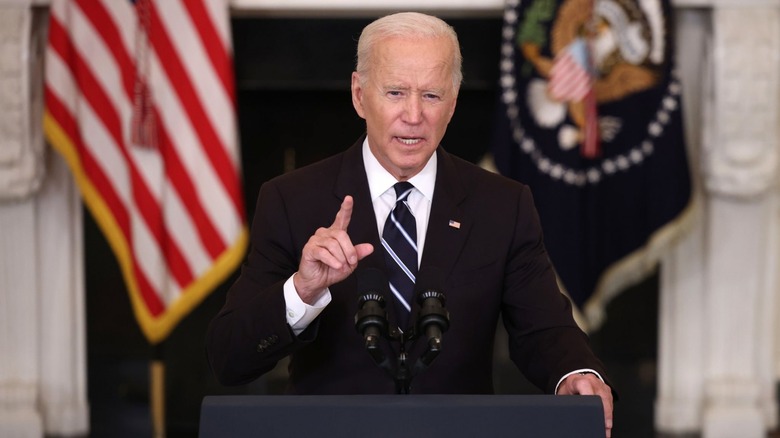The Biden Administration Is Planning New Tenant Protections
Since early 2021, median rent rates in the United States have increased significantly (via RentGroup Inc.). Pair this with rising home prices, spiking mortgage rates, and inflated costs of groceries, and you're left with a sharp increase in the overall cost of living. The Biden Administration has already worked to cut down gas prices and is attempting to clear college loan debt, but their newest proposal targets the largest expense that many people pay each month — rent.
According to Politico, a proposed wave of tenant protections comes in response to rising rent costs that followed the COVID-19 pandemic. The specific details of the anticipated proposal are still incredibly murky. However, the plan may potentially focus on grace periods for late payments and the right to legal counsel for those facing eviction. However, as ambiguous as the plans are at this early stage, they're undoubtedly alarming to many in a housing industry that's already suffering due to many of the same economic problems that are hitting consumers.
What this could mean for tenants
The exact measures included in this proposal have yet to be shared, but according to a recent statement from the White House, the Biden Administration is working towards a more equitable market. "We are exploring a broad set of administrative actions that further our commitment to ensuring a fair and affordable market for renters across the nation," spokesperson Robyn Patterson said. "We look forward to continuing to work with lawmakers to strengthen tenant protections and improve rental affordability." (via Politico)
We'll likely see the specifics of this proposal in the next few weeks. Still, even without any administrative action, renters will probably feel a bit of easing in pricing after the peak we saw post-pandemic. Prices are nowhere near as low as they were pre-2020, but they've seen a slow decline for consecutive months because of a rise in available properties. New construction is also finally taking off, easing prices as the availability of new properties contends with the existing high demand for rentals.
What this means for landlords
As the tide gradually shifts in favor of buyers and renters, it's no surprise that the White House's announcement might not enthrall owners of rental properties. Because the market is already beginning to level out, some argue that this proposal is too little, too late, and will only further complicate matters in the real estate world (via Politico). In theory, a decreased profit margin could mean fewer people are willing to buy properties and act as landlords, adding fuel to the fire of an already-fading seller's market. Additionally, as everyday life becomes more expensive, owners of a limited number of rental units may feel unfairly affected should sweeping changes take effect.
Because the details of the Biden Administration's proposal have yet to be made public, there's no way to predict its effects accurately. Still, history tells us major reforms are few and far between. Tenants holding out for lower rent costs can rest assured that surges in prices are finally beginning to decline, though they're unlikely to reach pre-pandemic levels anytime soon.


